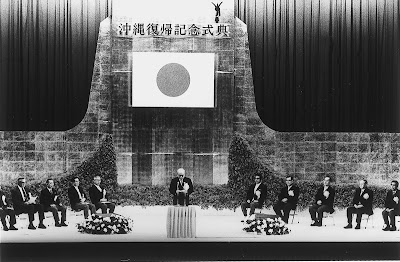Occupied Okinawa #1: Tinituhun
I will be in Okinawa for the next 10 days. Over the course of that time I will give several academic presentations at different universities to both professors and students about the historical and contemporary connections between Guam and Okinawa. I will also be meeting with some local political leaders and community organizations who are committed to demilitarization on the island. Ed Alvarez, the Director of the Decolonization Commission organized this trip through cooperation with some universities. He will be speaking on Guam's political status and current efforts to decolonize. Former
Senator and self-determination pioneer Marilyn Manibusan is also on the trip.
This year represents the 40th anniversary of the reversion of Okinawa to Japanese control. One of the biggest blind spots in recent Asia Pacific history centers around what exactly happens to Okinawa after World War II. Although we may see it as very Japanese, from the end of World War II to 1972, the island was not governed by Japan, but rather the United States military. Okinawa was governed in a very similar way to Guam, as its strategic importance made it necessary from the US perspective that it be deprived of rights, or that it become a political black hole. That is the era when the US is doing its best to form the foundation for its position as a global policeman, as a superpower, and so it is interesting as it is attempted to advertise itself as an avatar of freedom and justice, in the case of both Guam and Okinawa it first tries to cut them off from much of the world.
I will do my best to cover the events that I attend while I'm here for this blog. I decided to title my posts for this trip "Occupied Okinawa" to take advantage of all of the emerging theorizations of occupation from around the world, and also try to shape the possible interpretations of Okinawa's position to the point where we don't just see it as occupied by US military bases, but we can also see it occupied in a more general sense. Okinawa has its own history of colonization, something which both the US and Japan have contributed to both creating and obfuscating. Every corner of the world seems to be using occupation in order to say something critical about the distribution of resources or power there, and so Okinawa, as a place where you could and should use the lens very liberally, should "occupy" a greater part of this conversation.
This year represents the 40th anniversary of the reversion of Okinawa to Japanese control. One of the biggest blind spots in recent Asia Pacific history centers around what exactly happens to Okinawa after World War II. Although we may see it as very Japanese, from the end of World War II to 1972, the island was not governed by Japan, but rather the United States military. Okinawa was governed in a very similar way to Guam, as its strategic importance made it necessary from the US perspective that it be deprived of rights, or that it become a political black hole. That is the era when the US is doing its best to form the foundation for its position as a global policeman, as a superpower, and so it is interesting as it is attempted to advertise itself as an avatar of freedom and justice, in the case of both Guam and Okinawa it first tries to cut them off from much of the world.
I will do my best to cover the events that I attend while I'm here for this blog. I decided to title my posts for this trip "Occupied Okinawa" to take advantage of all of the emerging theorizations of occupation from around the world, and also try to shape the possible interpretations of Okinawa's position to the point where we don't just see it as occupied by US military bases, but we can also see it occupied in a more general sense. Okinawa has its own history of colonization, something which both the US and Japan have contributed to both creating and obfuscating. Every corner of the world seems to be using occupation in order to say something critical about the distribution of resources or power there, and so Okinawa, as a place where you could and should use the lens very liberally, should "occupy" a greater part of this conversation.




Comments